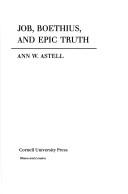| Listing 1 - 2 of 2 |
Sort by
|

ISBN: 0801429110 1501743171 1501733257 1501743163 Year: 2019 Publisher: Cornell University Press
Abstract | Keywords | Export | Availability | Bookmark
 Loading...
Loading...Choose an application
- Reference Manager
- EndNote
- RefWorks (Direct export to RefWorks)
Calling into question the common assumption that the Middle Ages produced no secondary epics, Ann W. Astell here revises a key chapter in literary history. She examines the connections between the Book of Job and Boethius' s Consolation of Philosophy-texts closely associated with each other in the minds of medieval readers and writers-and demonstrates that these two works served as a conduit for the tradition of heroic poetry from antiquity through the Middle Ages and into the Renaissance. As she traces the complex influences of classical and biblical texts on vernacular literature, Astell offers provocative readings of works by Dante, Chaucer, Spenser, Malory, Milton, and many others. Astell looks at the relationship between the historical reception of the epic and successive imitative forms, showing how Boethius's Consolation and Johan biblical commentaries echo the allegorical treatment of" epic truth" in the poems of Homer and Virgil, and how in turn many works classified as "romance" take Job and Boethius as their models. She considers the influences of Job and Boethius on hagiographic romance, as exemplified by the stories of Eustace, Custance, and Griselda; on the amatory romances of Abelard and Heloise, Dante and Beatrice, and Troilus and Criseyde; and on the chivalric romances of Martin of Tours, Galahad, Lancelot, and Redcrosse. Finally, she explores an encyclopedic array of interpretations of Job and Boethius in Milton's Paradise Lost, Paradise Regained, and Samson Agonistes.
Epic literature --- Imitation in literature. --- Influence (Literary, artistic, etc.) --- Literary form --- Literature, Medieval --- Typology (Theology) in literature --- Quotation --- Literary style --- Mimesis in literature --- Originality in literature --- Plagiarism --- Artistic impact --- Artistic influence --- Impact (Literary, artistic, etc.) --- Literary impact --- Literary influence --- Literary tradition --- Tradition (Literature) --- Art --- Influence (Psychology) --- Literature --- Intermediality --- Intertextuality --- European literature --- Medieval literature --- History and criticism&delete& --- Theory, etc --- History --- Classical influences --- Boethius, --- Bible. --- Biblia --- Bible --- Ayyūb (Book of the Old Testament) --- Giobbe (Book of the Old Testament) --- Hiob (Book of the Old Testament) --- Ijob (Book of the Old Testament) --- Iobus (Book of the Old Testament) --- Iov (Book of the Old Testament) --- Iyov (Book of the Old Testament) --- Iyyov (Book of the Old Testament) --- Job (Book of the Old Testament) --- Jobus (Book of the Old Testament) --- Livro de Jó --- Yop-ki (Book of the Old Testament) --- Criticism, interpretation, etc. --- In literature. --- Typology (Theology) in literature. --- Classical influences. --- History and criticism --- Theory, etc. --- Imitation in literature --- Literary studies: ancient, classical & medieval
Book
ISBN: 0268106231 Year: 2020 Publisher: Notre Dame, Indiana : University of Notre Dame Press,
Abstract | Keywords | Export | Availability | Bookmark
 Loading...
Loading...Choose an application
- Reference Manager
- EndNote
- RefWorks (Direct export to RefWorks)
Hailed in Sacred Scripture as the "beginning of wisdom" (Ps 111:10), the "fear of the Lord" is seldom mentioned and little understood today. A gift of the Spirit and a moral virtue or disposition, the "fear of the Lord" also frequently entails emotional experiences of differing kinds: compunction, dread, reverence, wonderment, and awe. Starting with the Bible itself, this collection of seventeen essays explores the place of holy fear in Christian spirituality from the early church to the present and argues that this fear is paradoxically linked in various ways to fear's seeming opposite, love. Indeed, the charged dynamic of love and fear accounts for different experiences and expressions of Christian life in response to changing historical circumstances and events.The writings of the theologians, mystics, philosophers, saints, and artists studied here reveal the relationship between the fear and the love of God to be profoundly challenging and mysterious, its elements paradoxically conjoined in a creative tension with each other, but also tending to oscillate back-and-forth in the history of Christian spirituality as first one, then the other, comes to the fore, sometimes to correct a perceived imbalance, sometimes at the risk of losing its companion altogether. Given this historical pattern, clearly evident in these chronologically arranged essays, the palpable absence of a discourse of holy fear from the mainstream theological landscape should give us pause and invite us to consider if and how--under what aspect, in which contexts--a holy fear, inseparable from love, might be regained or discovered anew within Christian spirituality as a remedy both for a crippling anxiety and for a presumptive recklessness. This book will be of interest to students and scholars of Christian spirituality, theology, biblical studies, religious studies, and religion and literature.
Fear of God --- Fear --- Christianity. --- Religious aspects
| Listing 1 - 2 of 2 |
Sort by
|

 Search
Search Feedback
Feedback About UniCat
About UniCat  Help
Help News
News